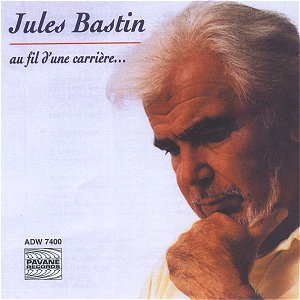This compilation covers 33 years of the career of the
Belgian bass Jules Bastin (1933-1996), beginning with the latest items,
two extracts from a concert held before the King of Belgium. If "Olí
Man River" shows off his rich, authoritative timbre, he is in his
element in Rossiniís calumny aria , relishing the words like the old
operatic hand he was. This would be a classic rendering were it not
for the fact that orchestral opposition is no less devastating for being
thoroughly disorganised.
From the other end of his career we can hear him already
a fully-formed artist in his prize-winning contributions to the 1958
Brussels Royal Conservatoire competition, with an un-named pianist doing
a remarkably good job of making Wotanís Farewell sound as if it were
actually written for the piano. His lower tones have not yet acquired
the richness that only maturity can bring but his upper register has
a youthful sheen which slightly dried up with the passing years.
A few years later he is characterful in the two Mussorgsky
songs (sung in French, as is Borisís aria from the 1958 competition)
and powerful in Schumannís "Two Grenadiers" but the pianist,
unobtrusive in these three pieces, proves a very heavy-handed lady indeed
in "An die Musik", contributing to a very un-liederlike rendering.
In due course Bastin explored the lieder repertoire
with the Austrian pianist Ursula Kneibs and the two examples of their
collaboration show him to have become an impressively idiomatic interpreter
. If this is part of a complete Schwanengesang I hope to hear it all
one day.
That the 1970s were vintage years for Bastin is also
suggested by "Ah! Si jíétais riche!", a piece about
which we get no information at all but which certainly parades his strong
communicative gifts. We also hear him reciting poetry in his native
Walloon. Unfortunately the absence of texts and translations, regrettable
throughout, renders this track quite incomprehensible to those whose
Walloon is less than fluent (in plain English, I didnít understand a
damn thing). For similar reasons, the Walloon air "Li pítit banc"
seems hardly interesting enough to hold the attention as pure music.
Personally, I am grateful to this disc for alerting
me to the fact that a singer I knew only by name may be rather more
wide-ranging and important than I had supposed. That said, the programme
as such is rather bitty and I doubt if I shall ever hear it straight
through again. I very much look forward to exploring the art of Jules
Bastin more fully in the future.
Christopher Howell

